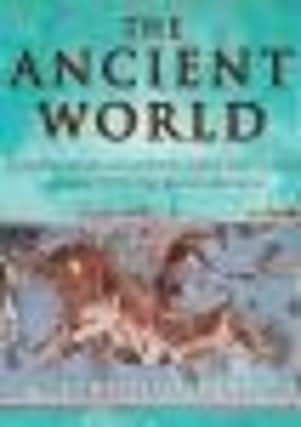Book review: The Ancient World by John Haywood


So what can we learn from the ancients?
Lancaster academic John Haywood’s comprehensive and colourful account of the earliest and greatest civilisations contains over 200 pages of reasons why the spectacular achievements of the distant past never fail to inform and fascinate us.
The ideas they formulated, their myths, works of art, impressive architecture and literature still have the power to speak to us across thousands of years with an amazing freshness and immediacy.
Advertisement
Hide AdAdvertisement
Hide AdFrom the Sumerians of ancient Mesopotamia through to the Aztecs of South America, Haywood paints a vast and vivid portrait of these complex societies, illustrating his guide with stunning photographs, maps, helpful timelines and the incredible and sometimes strange stories which bring to life both people and place.
Whether it’s the renowned gold foil Minoan death mask of Agamemnon or a fragment of fine textile which the ancient Incas considered just as valuable as gold, every picture tells a captivating tale of the birth of our own world.
Authoritative and accessible, The Ancient World also provides discussions on everything from tomb robbers and hieroglyphic writings to religious ceremonies, visions of the cosmos and sacred sites.
Haywood’s scope is epic and his focus wide-ranging, taking in the glories of the pyramids and the Parthenon alongside the towering majesty of Machu Picchu and the magnificence of the Roman Empire.
Advertisement
Hide AdAdvertisement
Hide AdMesopotamia, Egypt, northern India, China, the Mediterranean, the Andes and central America were the ‘cradles’ of early civilisations, all areas rich in natural resources to support dense populations.
The Sumerians, who ruled Mesopotamia (modern Iraq) from 3500-500BC, were the first people to understand that social organisation was the foundation of civilisation. They invented writing, bureaucracy, mathematics, glass, the wheel and farming techniques like the plough and irrigation.
‘When you are about to cultivate your field, keep a close eye on the opening of the dikes and ditches,’ warns a still surviving Sumerian farmers’ almanac.
The earliest writing was called cuneiform (meaning ‘wedge-shaped’) which was created by a reed stylus and remained in use for nearly 3,000 years. It used a system of signs either on their own or combined to make other words.
Advertisement
Hide AdAdvertisement
Hide AdEgypt was the first territorial kingdom and the first recognisably national state. Interest in one of the most revered ancient civilisations has never flagged since Napoleon Bonaparte invaded the country in 1798 and took with him a team of antiquarian scholars who made astonishing discoveries.
The pyramids have provided some of the most memorable stories of the ancient world, not least the figurines carrying farm implements which were placed in the tombs of the dead in case the deceased was called upon to do any work in the afterlife.
India was the birthplace of two of the great religions, Hinduism and Buddhism, as well as the home of the 1.8 million-word Mahabharata, the longest work of literature in the world, written in about 1302BC.
The incredible terracotta army of 7,000 soldiers created to guard the tomb of Shi Huang, the first Emperor of China who ruled from 221-210BC, also feature in Haywood’s chapter on one of the world’s longest-surviving civilisations.
Advertisement
Hide AdAdvertisement
Hide AdTheir greatest sage, Confucius, who lived from 551-479BC, remains central to Chinese thought. ‘Avoid foregone conclusions, arbitrary views, obstinacy and egoism,’ he wisely counselled.
Revel in the famous words of other age-old intellectuals, enjoy the panoramic view from the 4th century BC theatre at Delphi or get a fresh perspective on the Great Wall of China.
The Ancient World is truly a book of marvels, covering 5,000 years of cultural progress and providing a breathtaking journey of discovery into the history of human development.
(Quercus, hardback, £20)